Hamish McLachlan: Cummings keen to live up to expectations
His late grandfather Bart is part of racing folklore but James Cummings says he doesn’t shy away from expectations of greatness, writes Hamish McLachlan.
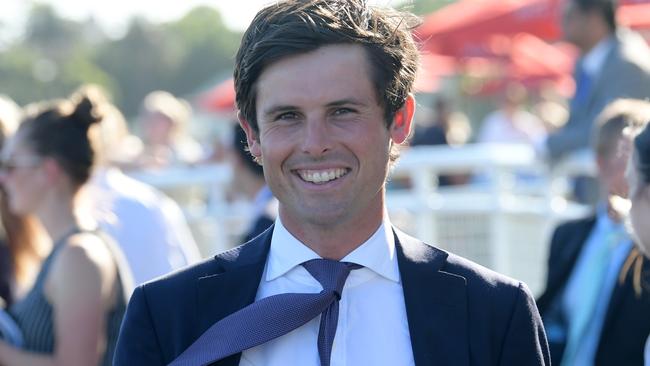
News
Don't miss out on the headlines from News . Followed categories will be added to My News.
James Cummings has a surname that is synonymous with racing in this country — but now he is forging his own path and building a reputation as one of this country’s most successful trainers. A business and training partner of his grandfather, Bart Cummings, before his passing, James was chosen to head the Australian training operations of the ruler of Dubai before he turned 30. We spoke about late nights and early mornings with Bart, big wage bills, self-doubt, form guides in lectures, Winx and picking up rocks.
SWIM CHAMP BRONTE CAMPBELL IS POETRY IN MOTION
THE BOY FROM BROADY TURNED EDDIE EVERYWHERE
JOHN ROBERT BELL ON ESCAPING A POW CAMP
HM: How many 11-year-olds do you reckon spend New Year’s Eve with their grandfather?
JC: (laughs) Not many, I guess, but I know I did! We had planned for me to go to trackwork the next morning with him, so we had New Year’s Eve together and got up at 3am while most of the world was still out. The horses, the people, the busyness of it all. It was a hub of activity, energy and I thought: “This is amazing — why isn’t everyone here?”
HM: Was that when you thought: “I’ll follow the family and get into the racing game”?
JC: I think there were a series of experiences like that day where they all added up to me thinking that life doing anything else wouldn’t be as fun. It’s rested really peacefully with me that I could spend time with horses and be 10 minutes from the city, or that I could rub shoulders with professionals that had spent decades mastering what they were good at — farriers, vets, track work riders — and I could train horses for and speak with captains of industry.
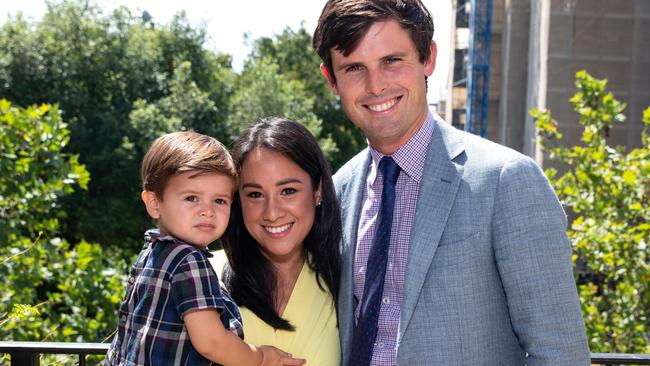
HM: The Cummings name — your great-grandfather Jim, your grandfather Bart and your old man, Anthony, have all done extraordinary things in racing. Did you ever feel like the name was going to be too heavy to go into the same trade as theirs or was it a natural, easy fit?
JC: Not really. I always knew people would judge me more harshly perhaps, but I felt I had the ability to get to a level where people thought: “He’s not a bad trainer” rather than “He isn’t
a patch on his dad or grandad”.
HM: Where do you start when you are getting into training?
JC: At the very bottom. That’s the best way. Cleaning out yards and mixing feeds and cleaning out the silos …
HM: … by jumping in the silo at the top, which would now be completely forbidden.
JC: … with the shovel in there, coughing your guts up. You’d get so itchy … but I loved it even though, as you say, it’d now be an OH&S issue I’m sure. Dad and Bart were very keen that I start at the bottom and get a feel for every aspect of it all. You can’t afford to not be across every part of the process.
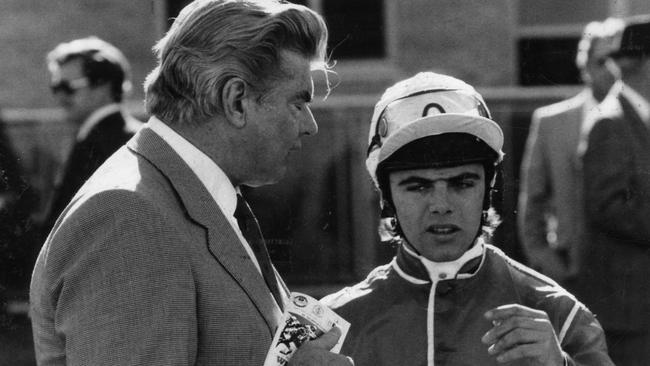
HM: Bart was good for the odd one-liner. Did you get one that morning as an 11-year-old?
JC: I think that was the morning he said: “Remember this, James — once a mug, always a mug”. I think he was keen for me not to fall into the “mug” crowd and to always be thinking astutely. He was also big on getting up and on with the day: “There’s a lot you can get done in your day before most people have even started theirs. The early bird catches the worm”. Bart was always thinking — of the future, and how to plan for it. He was trying to think a length ahead of everyone all the time.
HM: Did golf also lead you to horses?
JC: That’s right. I set myself a goal that while I was home from boarding school in the holidays, I’d work every spare minute in the stables so I could afford to join up at the Lakes Golf Club.
HM: And you got it done?
JC: I got it done, oblivious to the fact that by pursuing my hobby of golf so vehemently, I spent more time with the horses and fell more and more in love with the caper.
HM: What’d you get down to handicap wise?
JC: The best I’ve been is nine.
HM: And now?
JC: Since I’ve taken the job training all of these horses, I’ve drifted out closer to 13.
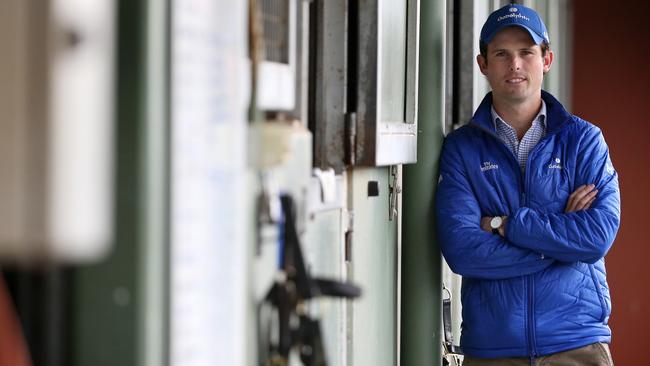
HM: Right. Six years at boarding school; my best guess is you’re an A student. Is that fair?
JC: I was at times a promising student. I did very well at some things, I was a very good English student, and I enjoyed my Latin. I did three-unit Latin because I enjoyed the history and the poetry that came with it. My history teacher, a guy called Mark Houston, a very, very passionate teacher, said: “Fancy a Latin scholar becoming a horse trainer — who would have picked that!”
HM: Was he pleased or devastated?
JC: I think he was quietly pleased about it.
HM: Someone told me that you went to most of your economics lectures with a form guide under your arm?
JC: I did. Our longest economics lecture was on a Wednesday morning, the day all the fields came out. Uni gives you a lot of autonomy and freedom … I didn’t quite have the application for it.
HM: Part of your horse education was to go and learn the breeding side with Sir Patrick Hogan at Cambridge Stud. What does he do when he ends up with an Australian that’s got a bit of cheek in him?
JC: He set his mind on testing my spirit. I’m not sure if he was instructed to knock off the cocky edges by Bart or not but he was a master at it. He had a 10-acre paddock full of rocks that he wanted cleared and he said: “James — I don’t mind how long it takes you but I need you to pick up every rock in there, so let me know when you are done!” Three weeks later, I was done.
HM: You went to work in a managerial role at your old man’s stables. I cannot work with my old man; I tried to jackaroo with him for a year and it didn’t work out. How did you get on with your dad?
JC: Jackarooing would be bloody interesting, because there’s a lot more intimacy with that than there is running a stable, I would say.
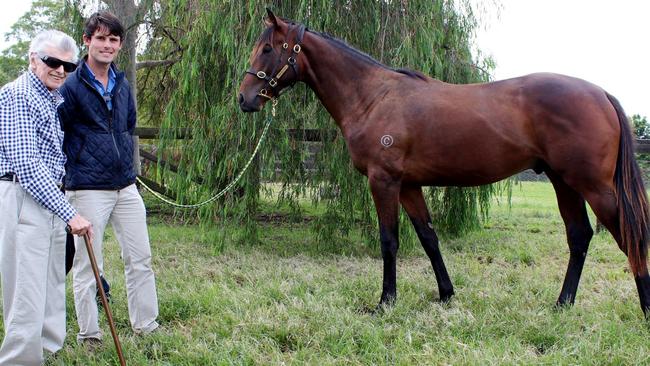
HM: Well, you’re in a Hilux sometimes, for six or seven hours, standing in sheep yards drenching sheep together for eight hours.
JC: But everything you do is under the microscope, because then he’s telling you: I want you to boil that kettle; don’t do it that way; I want you to saddle that horse; I don’t want you to tack that horse up that way; I want you to do the knot this way. You’re thinking, what’s the difference? It’s the same! He wants you to do it perfect, he wants you to be the perfect image of him, and you just want to please him. You want to get the job done, but you also want to make him proud.
HM: So true.
JC: Working with family can have its challenges. I once on a Saturday afternoon sat down at a bench at this little Italian place in Surry Hills, and I said: “Mate, can I just have a beer and a pizza.” This young Italian guy running the bar there looks at me, and he goes: “Let me guess. You’re a real estate agent?” I said: “No, I’m not. Why do I look like a real estate agent?” He said: “You work for family, don’t you …” I said: “How do you know?” and he goes: “Mate, I’m Italian. My dad owns this restaurant. I’ve worked for him for years. I know what it’s like to work with family.”
HM: Is that right?
JC: That’s a true story. He said: “You work for family, you’re the last one to get a holiday, and if you take a holiday, all of the staff think you’re a bludger. The expectations on you are enormous, you can’t ever meet them, no matter what you do. You want to make your own mark, you can’t go against your old man.”
HM: How did you and Anthony get on?
JC: We got on quite well, but it helped having me in a role without much pressure. He was very good at delegating the right things to the right people. I would oversee the yard, be on the phone and emailing owners, going to the races and representing him in the event that he wasn’t there. He identified that it could be strong for his business. As a result of that, there wasn’t a lot of pressure on me to actually impact the performance of the horses. Had there been that pressure, then my experience with him would have been much more like it was with Bart. That transitioned from helping Dad with parts of his business that came naturally to him. The intensity of that went up hundredfold working for Bart as his foreman, having to do the skill things all the time as well as represent Bart, on the frequent occasion that he wasn’t actually there.
HM: You went from Bart’s foreman to his partner. When you were with Bart, did you feel like a grandson, an employee or a partner? Was he very good at including?
JC: It was going from being the employee who was putting in 120 hours a week, 100 per cent dedicated, and I loved it, to becoming a partner, which was a transition that happened remarkably quickly. As Bart put it: “We could have one of those partnerships that John Hawkes did but if you want to be a partner with me, you’ve got to pay the wages”. I said: “Bart, how can I pay the wages when I’ve been on your wage roll for the past four years? I have no money.” He said: “I don’t care how you do it, if you want to be partners with me, you pay the wages. You take the risk.”
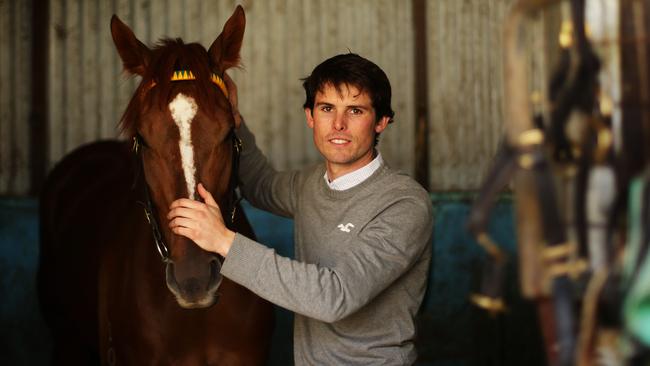
HM: It was all risk with you?
JC: The risk was 100 per cent mine.
HM: Tell me more about the partnership.
JC: When the clock struck 4am on August 1st, 2013, there I was, in partnership with Bart, but I had 100 per cent of the risk and everybody’s time was now on me. Don’t you worry, there were plenty of moments in the ensuing months where I wondered whether I would have enjoyed life a lot more as a detective, but I had a ripping start. That was the Thursday morning, and by the Saturday I had my first winner, Aliyana at Kembla Grange. The Saturday later I had my first winner at Randwick, in the city. It was a filly called Streaking Comet. She won with a heavy weight; Peter Robl rode her. We agreed together with Bart that we wouldn’t put an apprentice on and we’d run this little filly with a big weight. We thought of her as a bit of a bulldog. That same afternoon at Randwick, Eurozone sailed home to win the Listed Rosebud Stakes, and I thought, “I’m away here!” I’d had two great winners in a day at Randwick — wow. Chris Waller was walking by at the end of the day and said: “Good day at the office James, well done,” and he went to walk off and then he stopped and turned and looked back at me and said: “Did you have a double today?” And I said: “I did, actually” and he said: “My God, it took me five years to train a double — that’s pretty impressive”. I was thrilled to hear that from him.
HM: He’s a very good man. What’s the best thing you learnt from Bart?
JC: Bart’s ability to problem solve was extremely impressive to see. Just to be around him when he was in that frame of mind. What am I going to do with this horse? It got beaten in the Guineas, I know he’s a better horse than that. He missed the start, what am I going to do about that? He helped shape my mind to be able to sit back calmly and without panic, and think and say: “What’s the best way to manage my way out of this situation?” He was also big on: “Why do tomorrow what you can do today?”
HM: Is there any way anyone ever trains 12 cups in the history of mankind again?
JC: I think that it’s going to take someone pretty determined to embark on a 60-year path to achieve something as big as that.
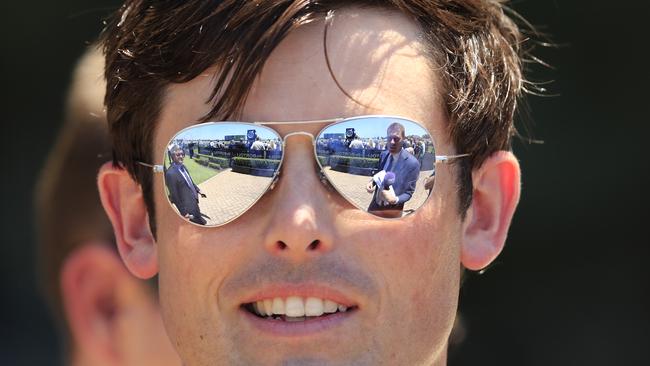
HM: Who rings you to say that the world’s biggest owner — His Highness Sheikh Mohammed bin Rashid Al Maktoum, Vice-President and Prime Minister of the United Arab Emirates and ruler of Dubai — wants you train his Australian operations for him?
JC: Not His Highness … I was called in to Godolphin’s office (the Maktoum family’s private horseracing stable), and I was enjoying what I was doing so much the job really hadn’t crossed my mind. Maybe people are more attractive when they’re enjoying what they’re doing, but it’s a meeting you take!
HM: Do you feel more pressure working for His Highness or more pressure working for yourself?
JC: It’s entirely different, but until you know what the pressure is like of having to pay a wage bill that you can’t jump over, you don’t know real pressure. When you have a debt over your head that you think: “What if I can’t train a vine to grow up a wall — then I’m really in trouble!” There is not a day that I take for granted when training Sheikh Mohammed’s elite athletes in world-class facilities.
HM: The financial pressure is stressful but now you’ve got the accountability to His Highness.
JC: You do — and I don’t want to let people down. You want to live up to everyone’s expectations. I do feel it, but I love it. I love being under pressure, and I love the expectation, but with the job comes extra scrutiny as you are expected to be performing well all the time. I can have a fourth in a Group 2, a third in a Group 2, I can have a second in a Group 1 beaten half a length, and have the interviewer say: “Not a good day for Godolphin”. You often think: “Tough crowd.” But you also wear it as a badge of honour as that’s our benchmark.
HM: What time’s your alarm set for?
JC: Five to three in the morning.
HM: And what time do you go to bed?
JC: It’s a bit naughty if I’m still up by nine o’clock. Crazy, isn’t it!
HM: What’s written on the back of your stopwatch?
JC: I have an old Casio, and the old Casios are the best because they give you the splits to the one thousandth of a second. There was one remaining black Casio in Bart’s top desk drawer after he passed away, and I went to the bootmaker in the arcade in Randwick, and I asked him if he could engrave: “Grandfather. Partner. Mentor.” He said, “No problem — that’ll be $30”. “Perfect — here’s my number, give me a call when it’s ready to be picked up, thanks”. He called me back and he said, “I just worked out who you are. Your grandfather was very good to me — don’t worry, there’ll be no charge”. He did it for me pro bono, and I’ve got “Grandfather. Partner. Mentor” engraved on the back of a Casio watch. I’ll be getting the battery in that watch replaced before I get the watch replaced.
HM: Will Alizee win the All-Star?
JC: I hope so. She’s going very well. Mystic Journey looks something special, and Happy Clapper is only being beaten by the best in the world.
HM: Just on Winx, what do you see when she runs?
JC: I see a horse that has transcended the efforts of hundreds of thousands of horses in Australian racing history before her. She’s the best of all that have come before her over hundreds of years. She seems to do it all so effortlessly, too. I don’t think we’ll see another like her — how lucky have we been to see her career. She’s perfection and there’s no greater advertisement in racing. She is racing.
HM: Mate, everyone that watches you do your thing has been very, very impressed. Thanks for chatting.
JC: Thanks, mate.
The $5 million All Star Mile is at Flemington on March 16.


